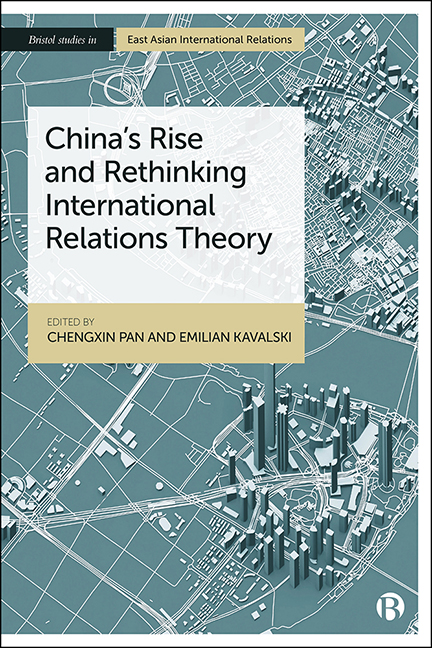Book contents
- Frontmatter
- Contents
- List of Abbreviations
- Notes on Contributors
- Acknowledgements
- Introduction: The Rise of China and Its Challenges to International Relations Theory
- PART I Theorizing China’s Rise: Beyond Eurocentric Knowledge Production
- PART II Theorizing China’s Rise: Critical Reflection on Mainstream Frameworks
- Epilogue: Towards International Relations beyond Binaries
- Index
8 - Deconstructing the Established Westphalian Architecture in Light of China’s Rise
Published online by Cambridge University Press: 15 September 2022
- Frontmatter
- Contents
- List of Abbreviations
- Notes on Contributors
- Acknowledgements
- Introduction: The Rise of China and Its Challenges to International Relations Theory
- PART I Theorizing China’s Rise: Beyond Eurocentric Knowledge Production
- PART II Theorizing China’s Rise: Critical Reflection on Mainstream Frameworks
- Epilogue: Towards International Relations beyond Binaries
- Index
Summary
Introduction
The establishment of a Westphalian world order gave rise to universally accepted Western norms for state sovereignty, legal state equality, and nonintervention, among other principles. Today, China is both challenging broadly accepted Western norms and capitalizing on certain Westphalian values. According to Chinese representative Yang Jiechi, who participated in high-level strategic talks with US Secretary of State Antony Blinken and US National Security Advisor Jake Sullivan on 18– 19 March 2021, China's political discourse emphasizes a defence of the UN Charter's core principle of respect for the sovereignty of individual countries. During this meeting, Yang presented China as both emphasizing its own characteristics and reminding the United States that it should not use a double standard when applying the UN Charter to international relations and governance. Ever since the onset of the COVID-19 pandemic, the world has witnessed a return to traditional forms of self-help sovereignty in cross-state competition. The pandemic is one of several reasons why cooperation and trust between different types of regimes have sharply declined while fragmentation has increased. In China's case, the more Beijing wants to defend its autonomy when confronting Western powers in areas such as foreign policy, the more it is being treated by the rest of the world as the main international threat, perhaps even bearing responsibility for the COVID-19 pandemic itself (Kavalski, 2021). In this chapter I will argue that this view of China is a product of our established way of understanding world affairs according to Westphalian state order principles and their epistemology, both built on assumptions regarding self-help and estrangement among nation states.
Some International Relations (IR) scholars have started to describe the political practices of China and other Asian countries as examples of an emerging ‘Eastphalian order’. It has to be acknowledged that this proposition suffers from some geopolitical limitations. For instance, the projected Eastphalian order appears to suggests that China and its neighbouring countries have the potential to form a strong multilateral base for pushing against the constraints of the existing Westphalian order, which might be a contributing factor to destructive competition among Asian countries.
- Type
- Chapter
- Information
- China’s Rise and Rethinking International Relations Theory , pp. 168 - 189Publisher: Bristol University PressPrint publication year: 2022

